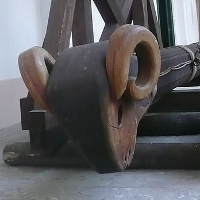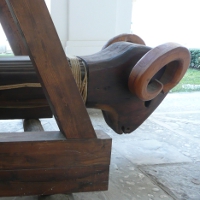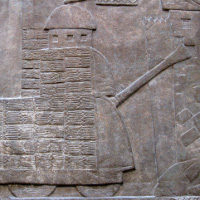Things of Middle-earth
Grond – Third Age
Type: Weapons
Meaning: club
Description:
The great battering ram 1 wielded against the gate of Minas Tirith by the forces of Sauron, under the command of the Witch King, during the Siege of Minas Tirith in the Third Age:
Great engines crawled across the field; and in the midst was a huge ram, great as a forest-tree a hundred feet in length, swinging on mighty chains. Long had it been forging in the dark smithies of Mordor, and its hideous head, founded of black steel, was shaped in the likeness of a ravening wolf; on it spells of ruin lay. Grond they named it, in memory of the Hammer of the Underworld of old. Great beasts drew it, Orcs surrounded it, and behind walked mountain-trolls to wield it....
The drums rolled and rattled. With a vast rush Grond was hurled forward by huge hands. It reached the Gate. It swung. A deep boom rumbled through the City like thunder running in the clouds. But the doors of iron and posts of steel withstood the stroke.
Then the Black Captain rose in his stirrups and cried aloud in a dreadful voice, speaking in some forgotten tongue words of power and terror to rend both heart and stone.
Thrice he cried. Thrice the great ram boomed. And suddenly upon the last stroke the Gate of Gondor broke. As if stricken by some blasting spell it burst asunder: there was a flash of searing lightning, and the doors tumbled in riven fragments to the ground.
The Return of the King, LoTR Book 5, Ch 4, The Siege of Gondor
Etymology
RUD- *rundā: Q runda rough piece of wood; ON runda, N grond club; cf. Grond name of Melko's mace, and name Celebrond 'Silver-mace'.
The Lost Road and Other Writings, HoME Vol 5, Part 3, The Etymologies
Notes
1 A battering ram is a siege engine originating in ancient times and designed to break open the masonry walls of fortifications or splinter their wooden gates....
In its simplest form, a battering ram is just a large, heavy log carried by several people and propelled with force against an obstacle; the ram would be sufficient to damage the target if the log was massive enough and/or it were moved quickly enough (that is, if it had enough momentum)... [The] log was swung from suspensory chains or ropes.
Rams proved effective weapons of war because old fashioned wall-building materials such as stone and brick were weak in tension, and therefore prone to cracking when impacted with sufficient force. With repeated blows, the cracks would grow steadily until a hole was created. Eventually, a breach would appear in the fabric of the wall—enabling armed attackers to force their way through the gap and engage the inhabitants of the citadel.
"Battering ram". Wikipedia, the free encyclopedia. 28 Dec. 2012.
<Wikipedia.org en.wikipedia.org/wiki/Battering_ram>.
Contributors:
Lyllyn 10Sept03
Links added 4Jan05
Elena Tiriel 28Dec12



